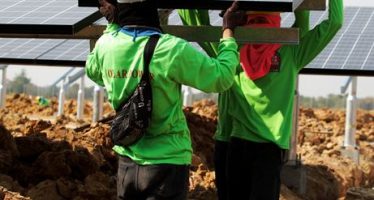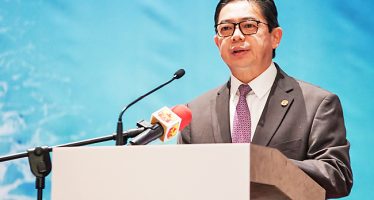UN-Backed Project to Help Colombian Farmers Move Away from Illicit Crops Towards Fair Trade Chocolate

Agricultural advisor in Colombia splits open a fruit to expose cacao seeds, used to make chocolate. Photo: Scott Wallace / World Bank.
A sweet new partnership between the United Nations, the Colombian and Austrian Governments and a renowned chocolate manufacturer is slated to bring free-trade practices and a critical source of income to Colombian farmers who have long relied on revenues from illicit drug crops, the Organization’s Office on Drugs and Crime (UNODC) has announced.
Launched today, the initiative – coordinated in tandem with, Zotter, an Austrian fair trade chocolatier – will see the introduction of a new premium chocolate bar made with cacao produced by small-scale farmers from Colombia’s Chocó region.
The Zotter partnership will allow 1,250 farmer families to move away from the cultivation of illicit crops, such as coca leaves, and into commercially viable livelihoods, generating “markedly higher incomes than those made illegally,” according to a UNODC press release.
The project is part of a wider UN-backed Colombian Government programme – known as “Montebravo” – which reaches over 120,000 farmer families and was set up to help reduce the economic dependence of farmers on coca leaf production.
“The viability of alternative sources of income ultimately depends on products that actually sell in national and export markets.”
– Aldo Lale-Demoz, UNODC Deputy Executive Director
Founded in 2007, Montebravo unites 10 farmers associations which manage some 1,200 hectares of cacao and also provides for other income-generating activities tied to forestry and agroforestry production, such as sustainable forest management and forest timber harvesting.
“The viability of alternative sources of income ultimately depends on products that actually sell in national and export markets,” said UNODC Deputy Executive Director, Aldo Lale-Demoz at an unveiling event, which took place at the Zotter factory in Graz, Austria. “Thanks to Zotter and all the partners in this initiative, this is what is happening.”
You may have an interest in also reading…
Executives: Smart Carbon Pricing Policies Can Drive Investment in a Cleaner Future
The IPCC’s Fifth Assessment Synthesis Report warns of the need to reduce greenhouse gas emissions by 40 to 70 percent
How Thailand’s Solar Power Visionary Built an Industry with a Boost from IFC
One of the winners of this year’s UN Momentum for Change awards has been transforming Thailand’s renewable energy capacity with
Annual Investment Meeting 2019 to Host Strategic Sessions to Draw Foreign Direct Investments
This year the event will witness the presence of 60 high level official The organizing committee of the Annual Investment

















































































